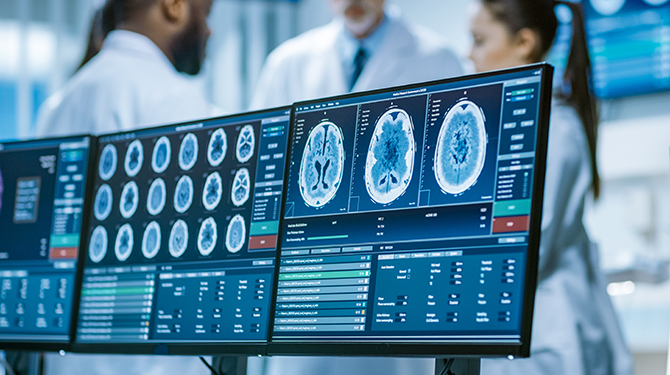Closures and Delayed Openings
To view our list of weather-related closures and adjusted hours, please visit our closings page.
 What, exactly, is the right way to care for some of the more intricate parts of the human body? We know because we do it every day.
What, exactly, is the right way to care for some of the more intricate parts of the human body? We know because we do it every day.
At Catholic Health, our approach to neurosurgery embraces both state-of-the-art technology and patient-centered care.
Neurosurgery includes surgical procedures of the brain, neck, and spine. Most inpatient surgeries are followed by careful 24/7 monitoring in a neuro-critical care unit. Then, specialized rehab is used in support of a successful recovery.
Combined with the vast clinical experience of our surgeons and advanced providers, the technological investments made by our system have placed this department on the cutting edge of neurosurgery.
Here, you’re not just another case – you’re our patient. Our talented neurosurgeons provide individualized care, focused on patient outcomes and quality of life.
Neurosurgeons perform tumor resections for growths in the brain, spinal cord, and their surrounding tissues. Patients may present to the hospital with a change in neurologic function, which can indicate a tumor. In other cases, a tumor on the brain or spine may have originated in another part of the body.
Tumor resections are carefully-planned procedures, with your neurosurgeon considering functioning tissues that may be nearby.
Strokes have one of two causes: a blocked blood vessel or brain bleed. A brain bleed, or intracranial hemorrhage, requires intervention by a neurosurgeon to present further damage to brain tissue. Neurosurgeons work to relieve pressure in the brain, then reassess to reduce the chance of permanent disability.
Also known as bulged, slipped, or ruptured, a herniated disc is one of the more common conditions treated by our spine specialists. It places abnormal pressure on the nerves of the spinal column, causing a range of symptoms. Conservative measures may give patients relief, but ultimately surgery is the only way to stop degeneration.
A brain aneurysm is a ballooning or bulging blood vessel. If the aneurysm bursts it becomes a hemorrhagic stroke, a life-threatening condition requiring immediate medical attention. Without rupturing, an aneurysm can still cause other health problems and bothersome symptoms, though it can also be asymptomatic.
Emergent cases require a timely, yet measured response. We provide comprehensive treatment in cases of traumatic brain and spinal cord injuries.
In 2019, Mercy Hospital of Buffalo made a close to $2 million investment by bringing world-renowned Brainlab technology to its operating room in South Buffalo. For our world-class surgeons, having access to advanced tools has become essential to the life-saving work they do on a daily basis.
Mercy Hospital’s transition to a digital operating room reflects the team’s dedication to embracing technology as it evolves.
Surgical patients are confident knowing that they’re being cared for by some of the region’s most talented surgeons using Mercy’s highly advanced technology. This includes: